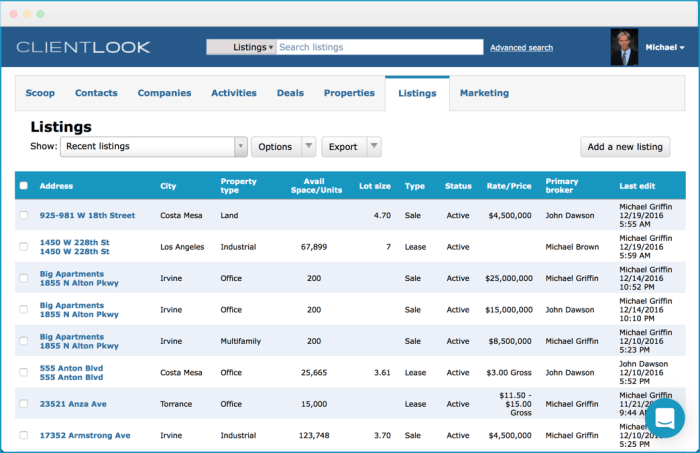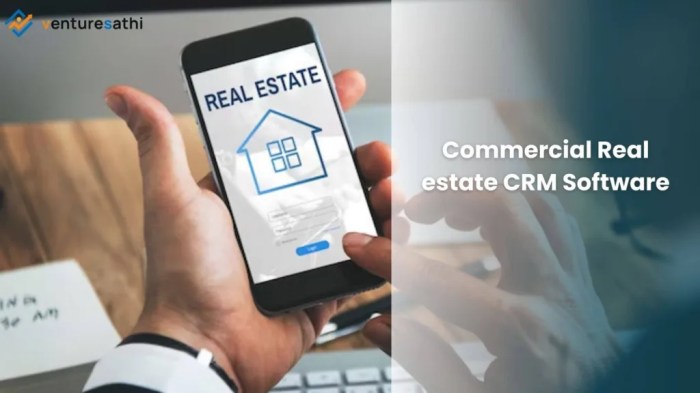Commercial real estate crm software – In the dynamic world of commercial real estate, staying organized, efficient, and ahead of the competition is paramount. This is where Commercial Real Estate CRM (Customer Relationship Management) software steps in, offering a powerful solution to streamline operations and boost profitability. This detailed guide will explore the intricacies of CRE CRM software, its key features, benefits, and how to choose the right solution for your business needs.
We’ll also delve into crucial aspects like integration, cost considerations, and the future of CRE CRM technology.

Source: clientlook.com
Understanding the Power of Commercial Real Estate CRM
A Commercial Real Estate CRM is a specialized software designed to manage all aspects of client interactions, property listings, marketing campaigns, and sales processes within the commercial real estate industry. Unlike generic CRM systems, CRE CRMs offer features tailored to the unique requirements of this sector, including property management tools, lease tracking, and sophisticated reporting functionalities. They centralize all your crucial data, improving collaboration, enhancing communication, and ultimately driving revenue growth.
Key Features of a Robust CRE CRM System:, Commercial real estate crm software
- Contact Management: Detailed contact profiles with comprehensive information about clients, prospects, and vendors, including contact history, communication preferences, and deal history.
- Property Management: Centralized database for all property listings, including photos, floor plans, specifications, and leasing information. This allows for easy searching, filtering, and sharing of property details.
- Lead Management: Automated lead capture and nurturing workflows, enabling efficient follow-up and conversion of prospects into clients.
- Deal Management: Tracking the entire sales lifecycle from initial contact to closing, including managing offers, negotiations, and document signing.
- Marketing Automation: Automated email campaigns, targeted marketing, and performance tracking to optimize marketing efforts and generate more leads.
- Reporting and Analytics: Detailed reports on key performance indicators (KPIs) such as lead conversion rates, sales performance, and marketing ROI. This allows for data-driven decision-making.
- Document Management: Secure storage and management of all relevant documents, including leases, contracts, and property details.
- Team Collaboration: Facilitates seamless collaboration among team members, ensuring everyone has access to the latest information and updates.
- Integration Capabilities: Ability to integrate with other essential business tools such as accounting software, email marketing platforms, and property listing websites.
Benefits of Implementing a Commercial Real Estate CRM
Investing in a CRE CRM offers numerous benefits that can significantly impact your business’s success. These benefits include:
- Improved Client Relationships: Personalized communication and proactive follow-up foster stronger client relationships, leading to increased loyalty and referrals.
- Increased Efficiency: Automation of repetitive tasks frees up valuable time for agents to focus on building relationships and closing deals.
- Enhanced Productivity: Centralized data and streamlined workflows improve team productivity and collaboration.
- Better Lead Management: Efficient lead tracking and nurturing processes maximize lead conversion rates.
- Data-Driven Decision Making: Detailed reporting and analytics provide insights into business performance, enabling informed decision-making.
- Increased Revenue: Improved efficiency, better lead management, and stronger client relationships all contribute to increased revenue generation.
- Competitive Advantage: CRE CRM systems provide a significant competitive edge in today’s fast-paced market.
Choosing the Right Commercial Real Estate CRM Software
Selecting the right CRE CRM requires careful consideration of several factors:
Factors to Consider When Choosing a CRE CRM:
- Your Business Needs: Identify your specific requirements and prioritize features that align with your business goals.
- Budget: CRE CRMs come with varying pricing models, so it’s crucial to set a budget and find a solution that fits within your financial constraints. Consider factors like licensing fees, implementation costs, and ongoing maintenance.
- Scalability: Choose a system that can grow with your business and accommodate future expansion.
- Ease of Use: Opt for a user-friendly interface that is intuitive and easy for your team to learn and use.
- Integration Capabilities: Ensure the CRM integrates seamlessly with your existing business tools.
- Customer Support: Reliable customer support is essential to ensure smooth operation and address any technical issues promptly.
- Security: Data security is paramount, so choose a CRM with robust security features to protect sensitive client and property information.
Popular Commercial Real Estate CRM Software Options
The market offers a wide range of CRE CRM solutions, each with its own strengths and weaknesses. Researching different options and comparing features is crucial before making a decision. Some popular choices include (but are not limited to):
- [Insert CRM Software Name 1]: [Brief description of features and benefits]
- [Insert CRM Software Name 2]: [Brief description of features and benefits]
- [Insert CRM Software Name 3]: [Brief description of features and benefits]
Note: This section should include a detailed comparison of at least three popular CRE CRM software options, highlighting their key features, pricing, and pros and cons.
The Future of Commercial Real Estate CRM
The CRE CRM landscape is constantly evolving, with new technologies and features emerging regularly. Future trends include increased integration with AI and machine learning for improved lead scoring, predictive analytics, and automated tasks. Expect to see greater emphasis on mobile accessibility, enhanced data visualization, and improved collaboration tools.
Frequently Asked Questions (FAQ)
- Q: What is the average cost of Commercial Real Estate CRM software? A: The cost varies significantly depending on the features, number of users, and vendor. Expect to pay anywhere from a few hundred dollars per month to several thousand dollars per month for enterprise-level solutions.
- Q: How long does it take to implement a CRE CRM? A: Implementation time depends on the complexity of the system and the size of your organization. It can range from a few weeks to several months.
- Q: Can I integrate my existing software with a CRE CRM? A: Most CRE CRMs offer integration capabilities with various business tools, including accounting software, email marketing platforms, and property listing websites. However, it’s essential to verify compatibility before purchasing.
- Q: What are the key metrics to track with a CRE CRM? A: Key metrics include lead conversion rates, deal closure rates, sales cycle length, marketing ROI, and client satisfaction.
- Q: Is cloud-based CRE CRM software better than on-premise solutions? A: Cloud-based solutions offer greater flexibility, scalability, and accessibility, while on-premise solutions provide more control over data security. The best option depends on your specific needs and preferences.
References: Commercial Real Estate Crm Software
[Insert links to reputable sources such as industry reports, software review sites, and vendor websites]
Call to Action
Ready to transform your commercial real estate business? Contact us today for a free consultation and let us help you find the perfect CRE CRM solution to streamline your operations and drive growth. Explore the potential of leveraging technology to achieve your business goals.
User Queries
What are the key benefits of using commercial real estate CRM software?
Key benefits include improved lead management, enhanced client relationship management, streamlined deal tracking, increased efficiency, better data analysis, and ultimately, higher profitability.
How much does commercial real estate CRM software typically cost?
Pricing varies widely depending on the features, vendor, and number of users. Expect to find options ranging from affordable monthly subscriptions to more enterprise-level solutions with higher costs.
How can I choose the right commercial real estate CRM software for my needs?
Consider factors such as your budget, the size of your team, the specific features you require (e.g., property management integration), and ease of use. Reading reviews and comparing different options is crucial.
What is the typical implementation process for a commercial real estate CRM?

Source: venturesathi.com
Implementation typically involves selecting the software, data migration (if needed), user training, and ongoing support. The timeline can vary depending on the complexity of your needs and the vendor’s support.
Can commercial real estate CRM software integrate with other tools I already use?
Many CRM systems offer integrations with other popular business tools, such as email marketing platforms, accounting software, and property management systems. Check the specific software’s capabilities to ensure compatibility.
